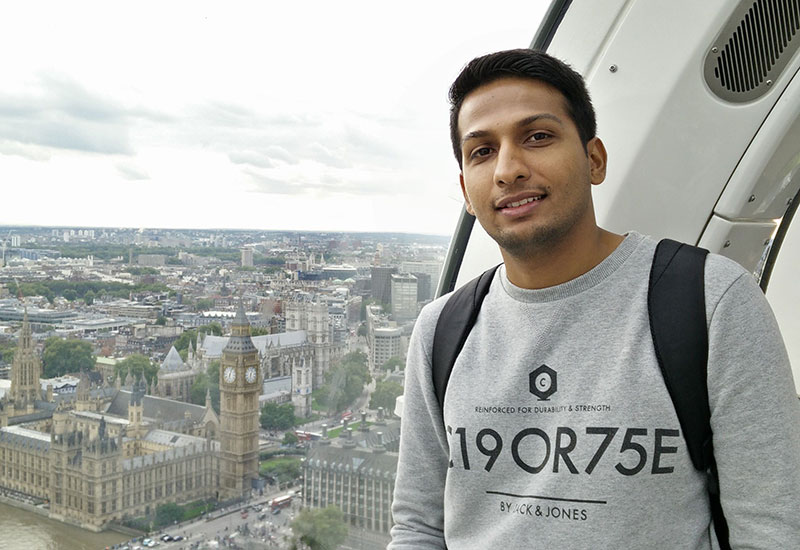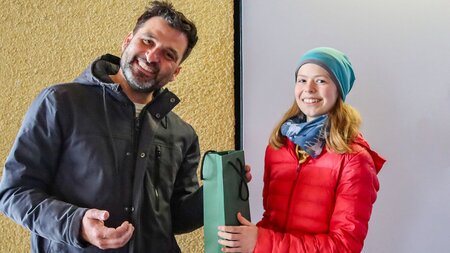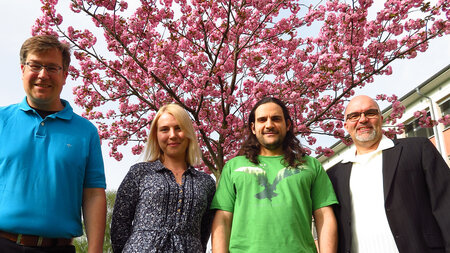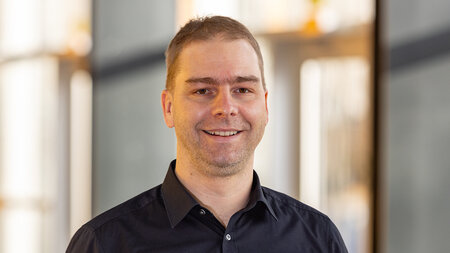“The best choice due to its international exposure and economic conditions for a student”
Interview with the DAAD-award winner of Technische Universität Chemnitz 2015, Murali Padmanabha
-

Murali Padmanabha was the winner of the award of the German Academic Exchange Service (DAAD) for exceptional international students at TU Chemnitz 2015 – he wants to use the money for travelling through Europe. He studies within the Master degree program "Embedded Systems" at TU Chemnitz and wants to pursue his academic career at the university by doing his PhD after having acquired his Master degree. Photo: private
First of all congratulations for the award of the DAAD-prize 2015 of Technische Universität Chemnitz. Please tell us something about you. Where are you coming from? What were the reasons for you to come to Germany and why did you select Technische Universität Chemnitz for doing your Master-studies in “Embedded systems”?
Thank you so much for your wishes. It has been an honor to receive this award. I come from Bangalore, a metropolitan city in India, very popular for its IT industry. It is also called the Silicon Valley of India for the same reason. Growing up in such a city always motivated me to work with electronics and computers. I followed my passion and obtained my bachelor`s degree in “Electronics and Communication Engineering". I always dreamed of pursuing my higher studies in a foreign country and to explore the world, but I was not sure on choosing the country until I started working for Bosch, that was my second employer. Working for a German company gave me a deeper insight into the country, its culture and its technical expertise. This inspired me to choose Germany over USA and Australia, the other popular destinations for higher studies amongst students from India. I wanted to also pursue my PhD after my Master. For this reason, I decided to study at a Technische Universität. Amongst the other options that I had from Germany, Chemnitz was the best due to its international exposure and its economic conditions for a student. Also the “Embedded systems” master program from Technische Universität Chemnitz was an interesting mixture of subjects from the Faculty of Electrical Engineering and Information Technology as well as from the Faculty of Computer Science, which offered a wide range of choice to focus on, given the fact that embedded systems are everywhere around us.
When you came over to Chemnitz, what were your first impressions of the city of Chemnitz and the university? What were the main challenges you met and how did you overcome them?
Coming from a busy city with a fast forward lifestyle, my life seemed to slow down in Chemnitz. I almost fell in love with the city at that instant. The university campus is exceptionally beautiful and I was intrigued with the blend of old and modern university buildings, which seemed to reflect its strong establishment and its focus towards modernization. The lecture halls particularly in Weinhold-Building are quiet unique. I would proudly talk about the campus with my friends and family. The transition was quiet rough at the beginning due to two main challenges: language and weather. Coming from a country where the weather is sunny almost the entire year, weather in Germany was difficult to get used to. But now I think I have adapted myself quiet well. Language, however, is another story. I have had difficulties outside the campus but the people in Chemnitz are quiet friendly and kind enough to help, so it was not that difficult to survive during the first few weeks. An interesting difference that I always found amusing to talk about was running out of groceries on a Sunday and realizing that the supermarkets had holidays too. Convenience of clubs within the campus and the “Beer culture” is something that is not so common on university campuses in India. I think this is something that students are really missing out.
As you have now passed already a bit of time in Chemnitz, in retrospect: What has changed now compared to your situation when you had “freshly” arrived at Technische Universität Chemnitz?
The things that have changed over the time are my German skills and my cooking skills. I can now communicate in German, although it is nowhere close to being fluent, and my mom is very happy that I can cook food myself. Now that I have met a lot of people and made lots of friends, Chemnitz feels like my second home.
In addition to your studies you have worked in companies in India and as research assistant at Technische Universität Chemnitz. Can you tell us something about the differences and maybe also similarities between “working culture” in India and in Germany?
I have worked as a programmer for Accenture for two years and for Bosch for one year. The work culture is a little different, my personal view is that, working in Germany is well planned and strictly bounds within eight hours of work but it is quiet common to see people working beyond nine hours of allocated work time in Indian companies. One difference I would like to particularly mention is the punctuality that I observe in Germany. I am very impressed and I am trying my best to make it part of me. Since my arrival in Chemnitz, I have been associated with two different professorships as a research assistant at different points of time. I would always prefer working in a university just for pure pleasure in solving real life problems which could make life better unlike a company, which is focused on solving problems that brings revenue to the company.
Which were your first feelings when you were informed that you had been selected as the winner of the DAAD-award of Technische Universität Chemnitz 2015?
I would say I was the happiest man on earth at that moment. I called up my parents and my best friends to notify them that I had a breakthrough. I should really thank Prof. Dr. Olfa Kanoun and Prof. Dr. Thomas von Unwerth and also the selection committee for those precious moments.
The DAAD-award is endowed with 1.000 Euro. Do you already have an idea what you would like to do with the money?
I always wanted to explore Europe, so I think I will use this money to travel around Europe and explore different cultures and cuisines and if I have any money left, I would like to buy some electronic hardware for my hobby projects.
What are your plans for the future after you have completed your Master studies at Technische Universität Chemnitz? Could you imagine to stay in Germany?
I would like to pursue my PhD and also work towards starting my own firm. I always dreamed of “being my own boss” and I would like to focus on making those dreams to come true. I would definitely like to stay in Germany and build an economic bridge with India through my firm. The only challenge I see at the moment is the language. I have been working on my German skills slowly, but I see a major hurdle when I think of the situation when I have to deal with bureaucracy and connecting with the right people to get my job done. I definitely need helping hands, which can guide me towards accomplishing my goals. I hope that things turn towards my favor and my stay in Germany gets more comfortable and fruitful.
The interview was done by Dr. Wolfgang Lambrecht, Head of the International Office of TU Chemnitz.
Katharina Thehos
23.11.2015





